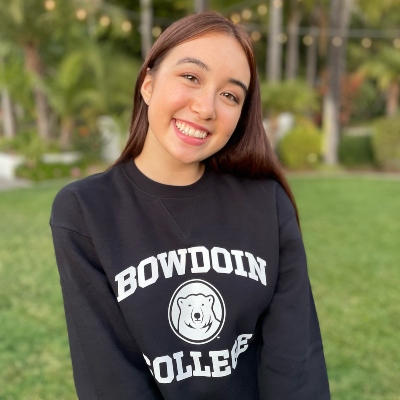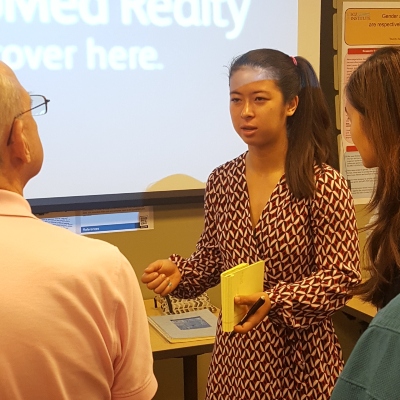17 December 2021
Students Share Co-Author Credit for Journal Article on ADHD Risk Factors
How does it feel to earn co-author credit on a scientific journal article while you’re still in high school? Pretty great, according to two students who accomplished that feat based on work they did after completing Research Scholars courses from UC San Diego Extension and the Boz Life Science Research and Teaching Institute.
High school students Katherine “Katie” O’Connell and Natalie Olander got their names on a journal article analyzing how various factors affect the likelihood that children will be diagnosed with ADHD (attention deficit/hyperactivity disorder). A third former Research Scholars student who is now in college, Sora Haagensen, also earned co-author credit on the article.
 “I was so happy!” said Katie (pictured, left), a senior at Poway High School. “I never thought this would be something I would do in high school. I was also proud our work was successful because I worked very hard, and so did the rest of our team.”
“I was so happy!” said Katie (pictured, left), a senior at Poway High School. “I never thought this would be something I would do in high school. I was also proud our work was successful because I worked very hard, and so did the rest of our team.”
Natalie, a senior at Veritas High School in Newberg, Oregon, also expressed pride in the achievement. “Getting an article published is a big milestone for all scientists,” she said. “To have already gotten listed as a co-author on a paper, it’s phenomenal!”
For Sora, a graduate of The Bishop’s School in La Jolla who now attends Brandeis University in Massachusetts, the ADHD article marks her second co-author credit. Earlier she contributed to an article about the genetics of a rare agave plant. “I am fortunate to have had great exposure to the world of scientific research early on,” Sora said by email.
The three all took Research Scholars Molecular Biology classes from the Boz Institute in Pacific Beach, which partners with Extension to offer research immersion programs for high schoolers. Natalie took the course remotely through a sponsorship from the Oregon Bioscience Association. New Research Scholars Life Sciences courses start in January.
The students enjoyed the coursework so much that they wanted to continue collaborating with Boz Institute scientists. Starting in 2020, the three joined Boz researchers in an analysis of national data about ADHD. Diagnoses of the condition are surging, causing “a growing health crisis in the United States,” the article states.
Research during lockdown
The researchers chose the topic partly because the data analysis could be done remotely during the pandemic lockdown, said Flannery McLamb, a Research Scholars instructor who is also a co-author of the article. “Boz put together a team of people who could work remotely because they couldn’t really come into the lab,” she said.
Through months of hard work, the researchers identified strong correlations between certain geographic and socioeconomic factors and cases of ADHD. The data clearly showed that ADHD diagnoses are more common among children living in the South and among those facing economic hardship and inhabiting unsafe neighborhoods.
The article appears in Scientific Reports, an online peer-reviewed journal published by Nature Research. Former Boz researcher Kesten Bozinovic is lead author, and Boz scientist Zuying Feng, McLamb and the three students are listed as co-authors, along with Boz Institute founder Goran Bozinovic.
The findings point the way for further research, McLamb said. “We don’t really have a direct link to say that one thing is causing another… but it will tell us where it would be worth the resources to look more into those interactions.”
The three students joined in weekly team meetings over Zoom and took on a significant role in the project, McLamb said. They surveyed previous scientific papers on the topic, then helped organize and analyze the data. And they even contributed to writing the finished article. “There are chunks of the writing in there that they wrote themselves,” McLamb noted.
Hooked on life sciences
 Natalie (pictured, right) said a biology class sparked her interest in life sciences in her sophomore year. “That’s why I was really interested in the research immersion program because I loved biology so much,” she explained. She aspires to become either a biomedical researcher or a physician-scientist.
Natalie (pictured, right) said a biology class sparked her interest in life sciences in her sophomore year. “That’s why I was really interested in the research immersion program because I loved biology so much,” she explained. She aspires to become either a biomedical researcher or a physician-scientist.
As the researchers analyzed data, Natalie was excited to see patterns emerging. “I thought it was so neat that you could use a national data set and then find trends from it,” she said. “It was really eye-opening, and it was a great experience. It gives me more knowledge stepping into other research and statistics.”
Natalie took on the project in addition to her schoolwork and extracurricular activities – she runs cross-country and plays the piano. “Doing this required a time commitment, and I did it alongside homework,” she said. “Our meetings would be after school, and I would fit in the work during the week.”
She was gratified to be part of a team that divvied up tasks to reach a goal. “It was cool to see the collaboration and be in a professional environment,” she said. “That has been a really helpful experience that has prepared me to continue in my research.”
Eye on the medical field
Katie said an interest in life science came naturally to her. An honors biology class in her freshman year deepened her interest, and the Research Scholars course convinced her to seek a career in the field. She plans to pursue a pre-med biology major with the goal of becoming a doctor.
The part of the project that was the most fun for her was helping to convert the study data into a series of elaborate charts and graphs. “That was quite difficult because we had so much data, and we had to figure out the best way to present it visually,” she said. “I liked that a lot.”
Like Natalie, Katie balanced the research with a busy schedule. At Poway High, she is vice president of the National Honor Society and president of Academic Team. She has also received a Gold Award in Girl Scouts and plays violin for San Diego Youth Symphony. “Since I really like doing the work, it didn’t feel tedious or like a chore,” she said. “That made it easier to commit.”
She believes the experience will help her going forward. “When I tell people I have a published paper, they’re super impressed,” she said, “… And I think it’s cool that I’m able to cite myself now!”
A leg up on college studies
Sora, (pictured below) who plans to major in biology at Brandeis with minors in computer science and linguistics, said the lessons she learned while working on the two journal articles are paying dividends for her in college.
 “The most important thing I learned from these experiences in publishing is not to give up when I think I have reached a dead end,” she said. “There were many times when I sat scratching my head and feeling stuck, but neither I nor my co-authors ever threw in the towel.”
“The most important thing I learned from these experiences in publishing is not to give up when I think I have reached a dead end,” she said. “There were many times when I sat scratching my head and feeling stuck, but neither I nor my co-authors ever threw in the towel.”
The techniques she learned for organizing and interpreting difficult information are also proving to be a boon. “They have been a lifesaver for me in college while learning different languages,” she said, noting that she has just finished her first semester of Japanese.
Now that the ADHD research is concluded, Natalie and Katie are working with Boz scientists on another project that could produce a journal article – a genetic study of the Irish strawberry plant.
Overall, the three students brought a lot to the ADHD research, McLamb said: “They were asking a lot of good questions and bringing up a lot of good points of things we should consider.”
“Throughout the process, I was really impressed with how hard they worked and the kind of drive that they had,” she added. “This wasn’t something they had to do, but they were still working hard on it every week.”
